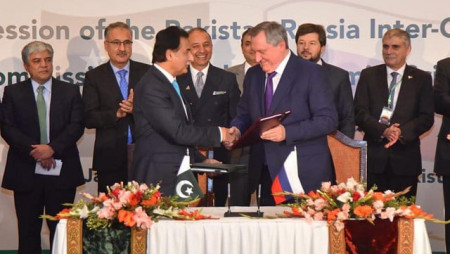By Naveed Naqvi
ISLAMABAD: Russia on Friday agreed to supply crude oil and oil products to Pakistan, with technical details of the deal to be finalized by March and Islamabad will pay for the imports in currencies of ‘friendly countries’, officials of both the countries said.
Pakistan officials and Russian Energy Minister Nikolay Shulginov, who is in Islamabad for an annual inter-governmental commission on trade and economy, held a series of meetings and signed a number of agreements to further strengthen collaboration in different areas including energy cooperation.
Petroleum Minister Musadik Malik told reporters that Pakistan wants to import about 30 to 35 percent of its total crude oil requirement from Russia and the first oil supplies can arrive in March 2023.
“I think we’ve agreed that by March we will conclude all of the commercial details and all of the technical details. Everything would be finalized by that deadline,” the minister said.
“We have, clearly in our conversations, stated that we’ve sorted out all the problems of the transportation, of shipment, of insurance, of transaction structure. So I don’t see any problem that in March we would see the finalization of this process.”
“Parco (Pak-Arab Refinery Company) is saying that they can use about a third, or 30 to 35 percent of Russian origin crude oil, the PRL (Pakistan Refinery Limited) believes that up to about 35 percent of their crude can be of Russian origin, and Byco [Petroleum] believes that their refinery can use up to 80 to 90 percent of Russian crude oil,” Malik said.
After signing deals with Pakistan, Russia’s Energy Minister Shulginov told reporters Moscow would allow Pakistan to pay for its energy purchases “in currencies of friendly countries.”
“With our Pakistani colleagues, we held negotiations and we discussed finances and banking cooperations, and we have agreed that payments would be made in the currencies of friendly countries,” an interpreter quoted Shulginov as saying.
A joint statement later released by the Pakistan-Russia IGC added that the technical details of the deal would be finalized in March 2023.
“Both sides agreed that after consensus on the technical specifications achieved, the oil and gas trade transaction will be structured in a way that has mutual economic benefit for both countries. The process to be completed within March 2023,” the statement said.
Islamabad and Moscow also agreed to strengthen energy cooperation and trade and broaden energy infrastructure investment “based on strategic and favorable commercial terms” and, to this end, said they would work on a “Comprehensive Gas Infrastructure Plan for Energy Cooperation,” to be completed in 2023.
Among the pillars of the new energy cooperation plan, the two sides reaffirmed their commitment to the long-delayed Pakistan Stream gas pipeline project, also known as the North-South gas pipeline, that is to be built in collaboration with Russian companies.
The two countries agreed in 2015 to build a 1,100 km (683 mile)-long pipeline to deliver imported liquefied natural gas (LNG) from Karachi on the Arabian Sea coast to power plants in the northeastern province of Punjab.
“Both sides agreed that the Pakistan Stream Gas Pipeline Project should be considered in terms of a comprehensive infrastructure which is economically viable for sustainable gas infrastructure development ensuring affordable gas supplies,” the statement said.
In October last year, Finance minister Ishaq Dar said the country is ready to buy fuel from Russia if the same rate that India is paying is applicable to Pakistan as well and the West would have no problem with Pakistan importing discounted fuel.
Russian crude oil has been subject since December to a European maritime embargo and a price cap decided by the EU, the G7 and Australia, two measures intended to deprive Moscow of significant revenue.
Pakistan, which relies on most of its energy imports from friendly Gulf countries, has long been hit by energy shortages because of a combination of factors including a poor economy, mismanagement and a lack of storage facilities. Oil and energy make up the largest portion of Pakistan’s imports bill.
Copyright © 2021 Independent Pakistan | All rights reserved




